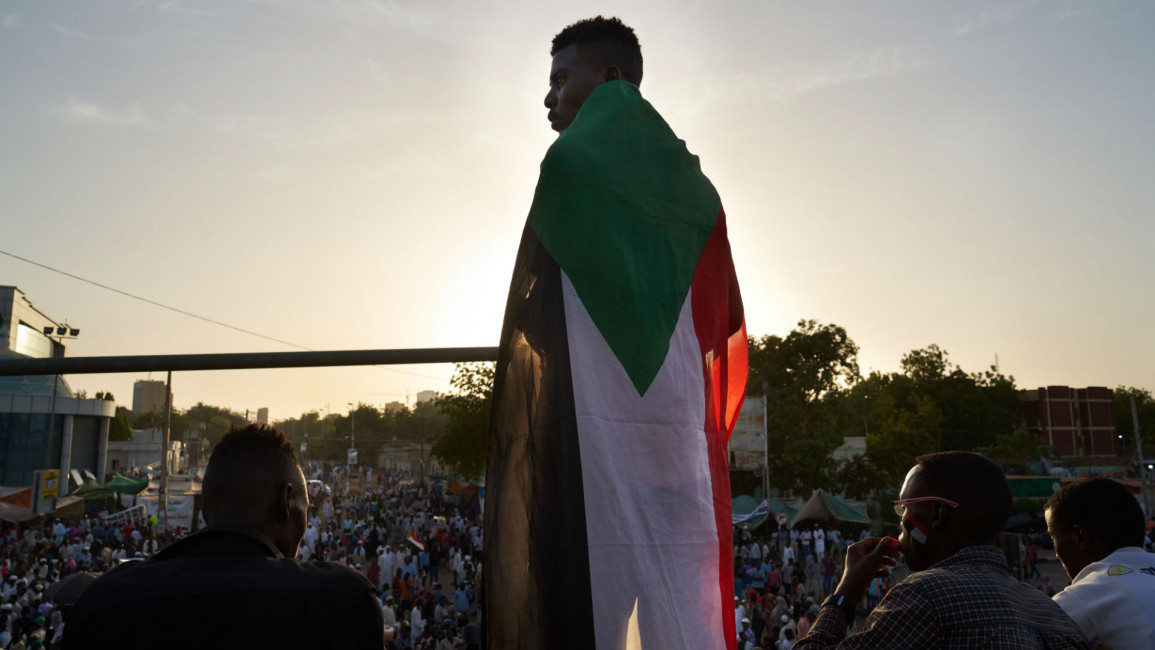Sudan to form transitional parliament after signing peace deal 'next month'
Sudan to form transitional parliament after signing peace deal 'next month'
Khartoum will form the long-awaited transitional parliament after signing a final peace agreement with a coalition of rebel factions, a leading political umbrella group said.
2 min read
The legislative council is a key part of Sudan's fragile power-sharing agreement [Getty]
Sudan is to form its transitional parliament next month after signing a peace agreement with a coalition of rebel factions, the Forces for Freedom and Change umbrella group announced on Saturday.
"All discussions must be completed so that the Legislative Council is formed, immediately after the signing of the peace agreement on April 9, without any additional delay," the coalition of political factions, unions and civil society groups said according to The Sudan Tribune.
The announcement of the transitional legislative council promised in a July power-sharing agreement has been much delayed.
While the joint military-civilian sovereign council and a civilian cabinet led by Prime Minister Abdalla Hamdok were formed shortly after a deal was inked between protest leaders and the military, delays in several key developments in Sudan's democratic transition have been linked to Khartoum's stop-start peace negotiations with rebel groups.
Around two-thirds of the seats in the transitional parliament are ear-marked for members of the Forces for Freedom and Change (FFC), an umbrella group of forces involved in the mass protest movement that unseated former dictator Omar al-Bashir in April last year.
The other third of seats are designated for groups who backed the revolution but are not part of the FFC.
The umbrella group said that consultations with Sudanese military leaders are required to decide which groups can join the transitional parliament.
The legislative council will be formed after a peace deal due to be signed on April 9 with the Sudan Revolutionary Front (SRF), a coalition of rebel factions from the country's Darfur, South Kordofan and Blue Nile conflict zones.
One rebel faction has largely shunned the peace talks in the South Sudanese capital Juba, however.
One of the country's largest rebel groups, a faction of the Sudan People's Liberation Movement-North led by Abdel Aziz al-Hilu, refuses to sign a deal before Khartoum agrees to discuss a secular state and self-determination for the conflict-torn regions.
Known as the SPLM-N Al-Hilu, the faction controls large swathes of territory in the Blue Nile and South Kordofan states.
The FFC on Saturday urged the trasitional government to partake in talks with the SPLM-N Al-Hilu and reach a final, lasting peace deal.
Under the power-sharing agreement, rebel factions in the SRF would be included in the two-thirds of the transitional legislative council allocated to the FFC, whereas groups such as the SPLM-N Al-Hilu would be included in the remaining third of seats.
Follow us on Facebook, Twitter and Instagram to stay connected
"All discussions must be completed so that the Legislative Council is formed, immediately after the signing of the peace agreement on April 9, without any additional delay," the coalition of political factions, unions and civil society groups said according to The Sudan Tribune.
The announcement of the transitional legislative council promised in a July power-sharing agreement has been much delayed.
While the joint military-civilian sovereign council and a civilian cabinet led by Prime Minister Abdalla Hamdok were formed shortly after a deal was inked between protest leaders and the military, delays in several key developments in Sudan's democratic transition have been linked to Khartoum's stop-start peace negotiations with rebel groups.
Around two-thirds of the seats in the transitional parliament are ear-marked for members of the Forces for Freedom and Change (FFC), an umbrella group of forces involved in the mass protest movement that unseated former dictator Omar al-Bashir in April last year.
The other third of seats are designated for groups who backed the revolution but are not part of the FFC.
The umbrella group said that consultations with Sudanese military leaders are required to decide which groups can join the transitional parliament.
The legislative council will be formed after a peace deal due to be signed on April 9 with the Sudan Revolutionary Front (SRF), a coalition of rebel factions from the country's Darfur, South Kordofan and Blue Nile conflict zones.
One rebel faction has largely shunned the peace talks in the South Sudanese capital Juba, however.
One of the country's largest rebel groups, a faction of the Sudan People's Liberation Movement-North led by Abdel Aziz al-Hilu, refuses to sign a deal before Khartoum agrees to discuss a secular state and self-determination for the conflict-torn regions.
Known as the SPLM-N Al-Hilu, the faction controls large swathes of territory in the Blue Nile and South Kordofan states.
The FFC on Saturday urged the trasitional government to partake in talks with the SPLM-N Al-Hilu and reach a final, lasting peace deal.
Under the power-sharing agreement, rebel factions in the SRF would be included in the two-thirds of the transitional legislative council allocated to the FFC, whereas groups such as the SPLM-N Al-Hilu would be included in the remaining third of seats.
Follow us on Facebook, Twitter and Instagram to stay connected


![President Pezeshkian has denounced Israel's attacks on Lebanon [Getty]](/sites/default/files/styles/image_684x385/public/2173482924.jpeg?h=a5f2f23a&itok=q3evVtko)



 Follow the Middle East's top stories in English at The New Arab on Google News
Follow the Middle East's top stories in English at The New Arab on Google News


